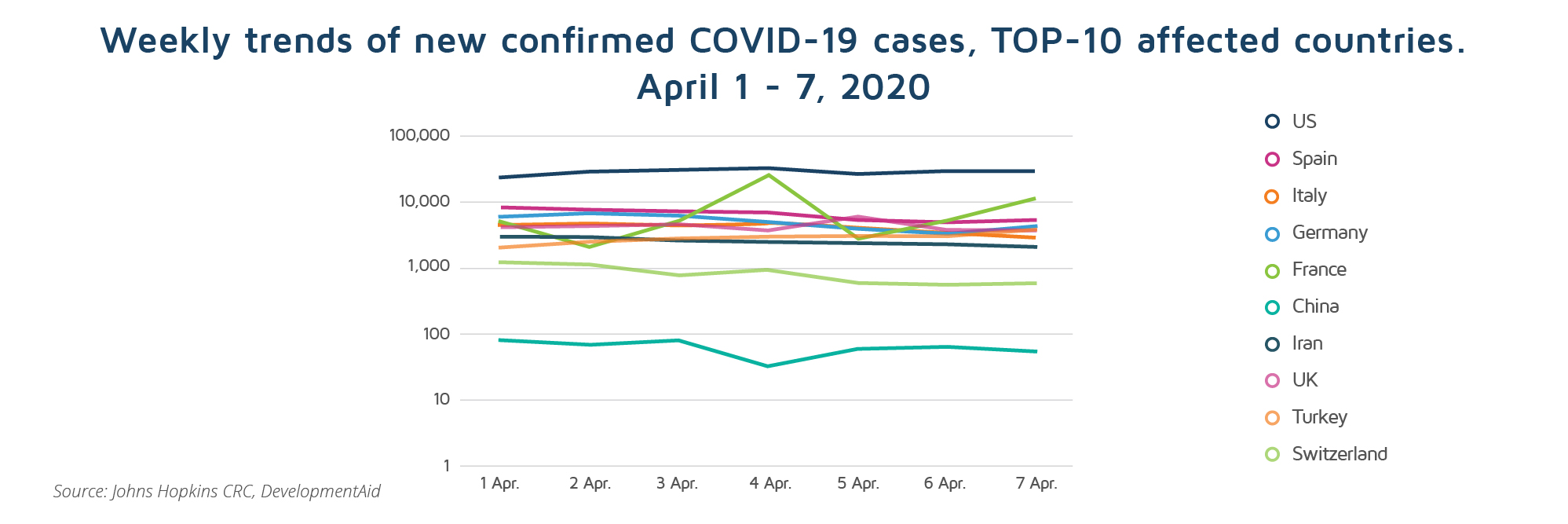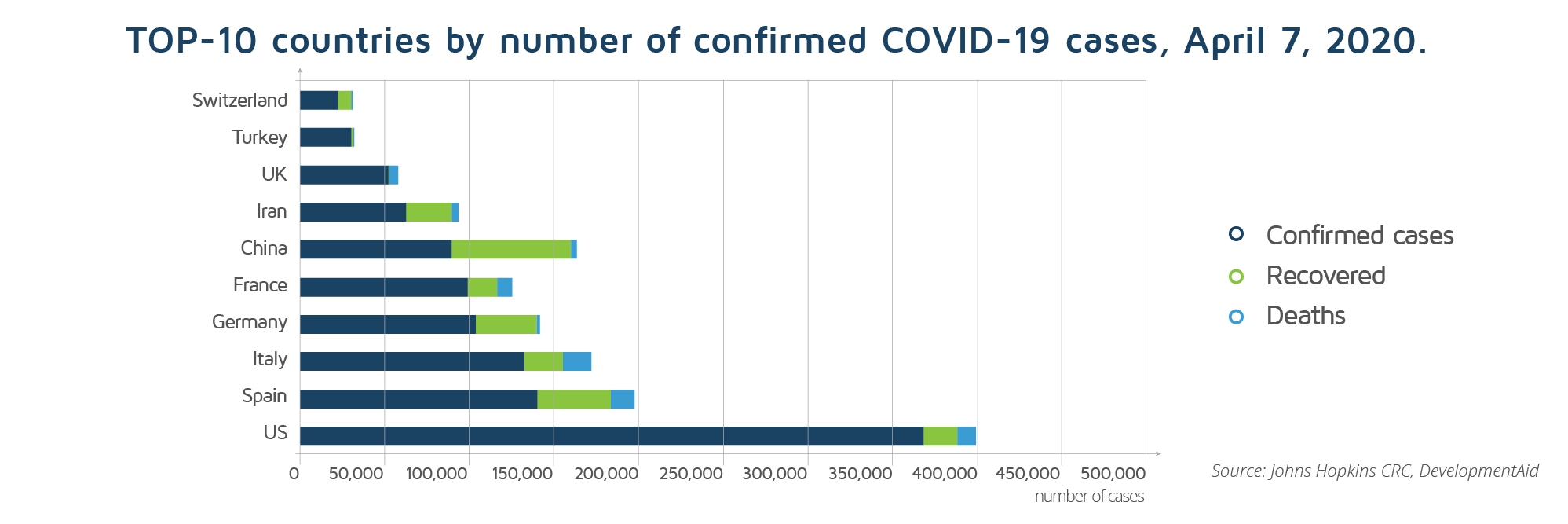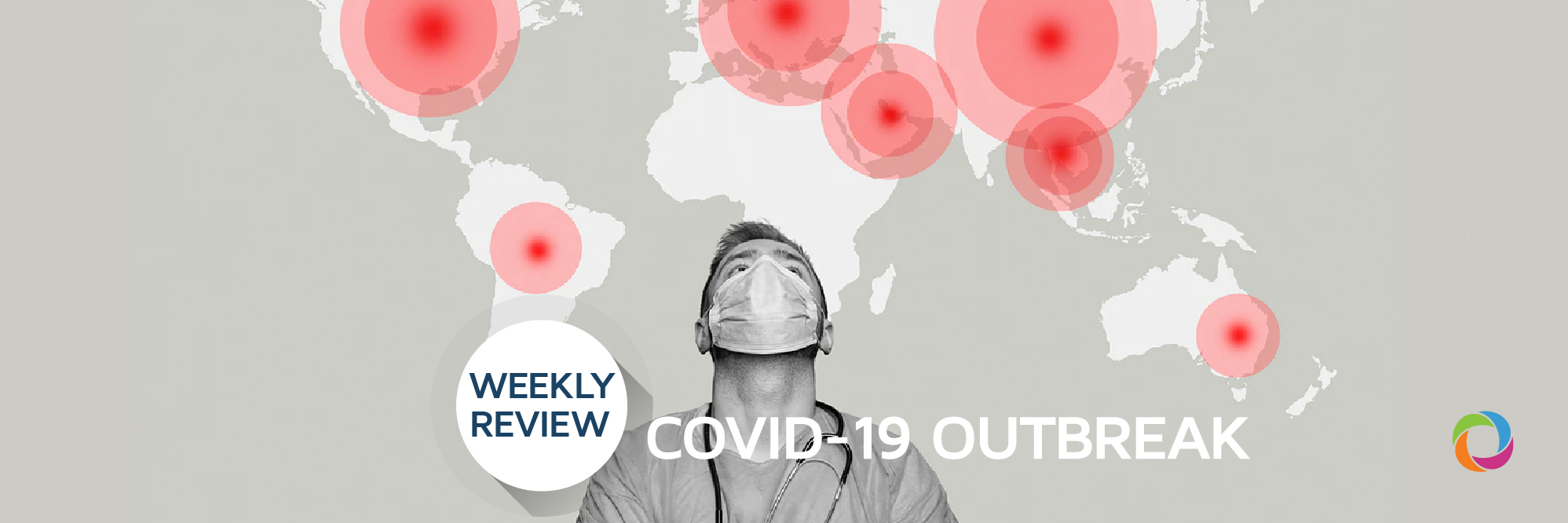(April 2 – 7, 2020)
Last week’s trends
-
- Fact-checked: China has closed the last of its remaining coronavirus hospitals. It is now providing technical assistance and advice to other affected countries, including the EU
- So far, the global food supply chain is withstanding the effects of the COVID-19 pandemic but the situation may worsen
- Developing countries will be helped to mitigate the disruption to education caused by the closure of schools
- The World Health Organization has called for countries to use personal protective equipment more wisely – that is, prioritizing masks and other protective gear for hospitals
- With more than 70 countries in search of effective treatment and about 20 institutions and companies racing to develop a COVID-19 vaccine, social distancing remains the best prevention measure available
- With nearly 4 billion people staying at home because of lockdowns, violence against women and girls is likely to increase
- Wash your hands! The World Trade Organization has said that the average tariff applied for hand soap is 17% but some WTO members are applying tariffs as high as 65%
- COVID-19 may affect international investment agreements. High-level meetings and summits, as well as other important events, have been cancelled or postponed due to the pandemic. The crisis may also have implications for the negotiation of international investment agreements.
Despite a doubling of the number of COVID-19 patients since the last DevelopmentAid review, a subtle downturn in new cases has been observed in a number of countries heavily affected by the pandemic. Since April 1, Italy, Spain, Germany and Iran have registered fewer new patients on a daily basis.

At the same time, 1.3 million global cases of the novel coronavirus had been registered by April 7th. The most affected countries by the number of patients are the United States, Spain, Italy, Germany and France. So far, these five nations have diagnosed over 830,000 COVID-19 cases. The virus is now present on every continent except the Antarctic.
Almost 300,000 people have recovered from the infection, while 76,000 have died, according to Johns Hopkins Coronavirus Resource Center.

The World versus COVID-19
International organizations and countries continue to be proactive in responding to the pandemic and the economic struggle it brings.
The World Bank has approved an initial set of emergency support operations for developing countries around the world. The first group of projects, amounting to US$1.9 billion, will assist 25 countries. On April 2nd, the organization also announced it is working worldwide to redeploy resources in existing projects of up to US$1.7 billion. The WB press release states that the organization is prepared to “deploy up to $160 billion over the next 15 months to support COVID-19 measures that will help countries respond to immediate health consequences of the pandemic and bolster economic recovery”.
One of the biggest donors in the world, the European Commission, has announced a new instrument for unemployment risk mitigation in European Union member states. The temporary Support to mitigate Unemployment Risks in an Emergency (SURE) is designed to help to protect people in work and jobs affected by the coronavirus pandemic.
Across the Atlantic, Canada has announced funding of approximately $159.5 million to support international efforts to fight the pandemic. Assessing that the negative impacts of the pandemic may have significant and lasting effects on women and children in developing countries, Karina Gould, Minister of International Development, urged governments to support one another.
“The COVID-19 virus knows no borders. This has been a wake-up call for the world to stand in solidarity and work together. If there was ever a time for countries and governments to support one another and invest in health globally, it is right now.”
Karina Gould, Minister of International Development, Canada
More good news came from the United Nations who confirmed that global cereal stocks are at comfortable levels and the outlook for wheat and other staple crops is positive for the rest of this year. However, the behaviour of the larger importers could cause prices to rocket. If consumers lose confidence in a reliable flow of basic food commodities, panic buying could ensue, driving prices up.
With increased funding being provided by various donors across the world to assist developing countries in the fight against the COVID19 pandemic, rapid international public procurement processes have become necessary. Thus, quicker reactions to public tenders can significantly increase the efficiency of the world response to COVID-19. DevelopmentAid has announced free access to the COVID-19 tender and grant notices that are available on its platform. This action is intended to accelerate the innovative coronavirus response efforts and increase their efficiency. Suppliers of medical equipment, consulting firms and NGOs, as well as humanitarian organizations, can access free of charge all the currently available open and forecasted health related tenders and grants using a single resource.
DevelopmentAid will publish the next Weekly Review of the coronavirus situation across the world on April 15. You can read the previous review by following this link. Subscribe to our newsletter and learn more about the coronavirus outbreak and the efforts being made to tackle it by the international development community.
About COVID-2019 Coronaviruses are a large family of viruses that are common in many different species of animals including camels, cattle, cats and bats. Rarely, animal coronaviruses can infect people and then spread between them such as was the case with MERS (2012) and SARS (2003).The symptoms of the virus are very similar to those of a common cold – runny nose, headache, cough, sore throat, fever, a general feeling of being unwell. Blood tests are necessary in order to prove the presence of the virus in the organism. Named by scientists as the “Wuhan seafood market pneumonia virus”, COVID-19 is a coronavirus, like MERS and SARs, all of which have their origins in bats. Initial reports show that, in the early stages of the outbreak (early January 2020), many of those infected in Wuhan had some link to a large seafood and live animal market – the Huanan Seafood Wholesale Market, mainly its western wing where wildlife animals are traded. This suggests that the virus initially affected an animal and subsequently spread to a person in a what a CDC has called “the species barrier jump”.

